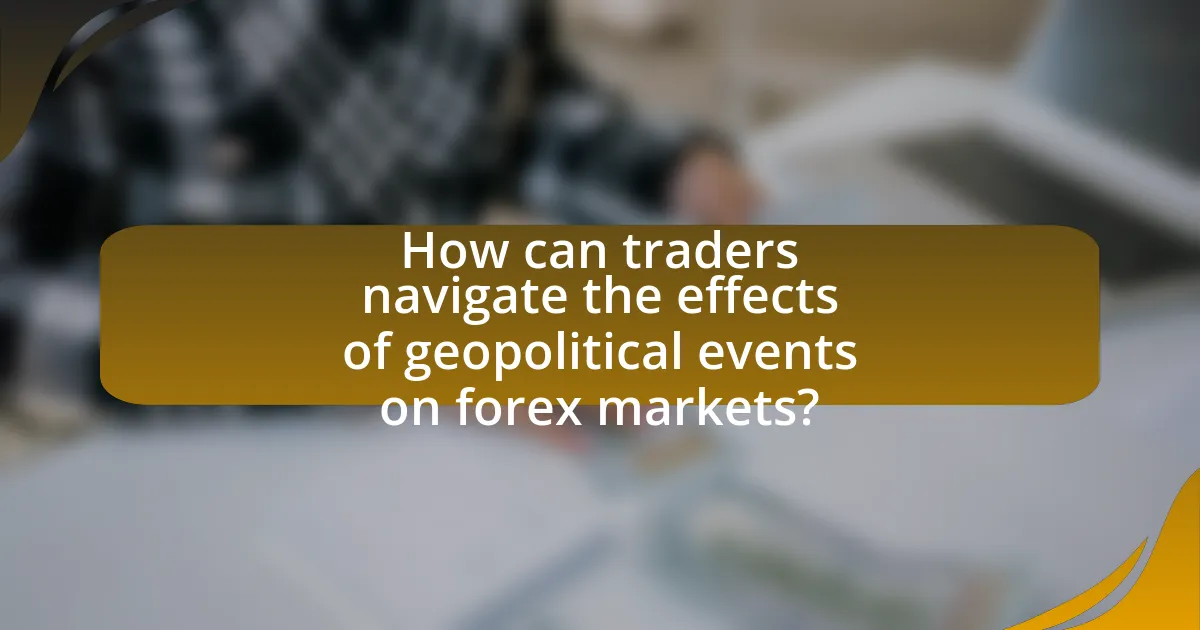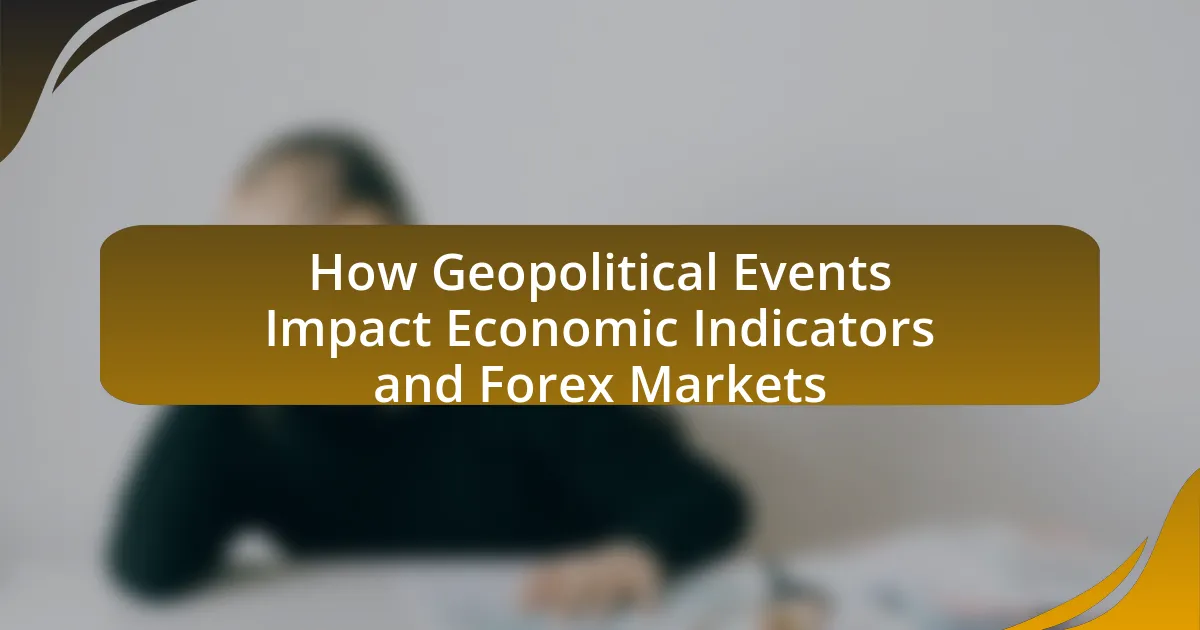Geopolitical events play a crucial role in shaping economic indicators and influencing forex markets. This article examines how factors such as political instability, conflicts, and sanctions affect key economic metrics like GDP growth, inflation rates, unemployment, trade balances, and currency values. It highlights historical examples, such as the 2008 financial crisis and the Brexit referendum, to illustrate the direct correlation between geopolitical tensions and market volatility. Additionally, the article discusses strategies for traders to navigate these impacts, emphasizing the importance of diversification, risk management, and staying informed about global developments.

How do geopolitical events influence economic indicators?
Geopolitical events significantly influence economic indicators by altering investor sentiment, trade dynamics, and government policies. For instance, conflicts or political instability can lead to increased uncertainty, causing stock markets to decline and volatility to rise, as seen during the 2008 financial crisis when geopolitical tensions contributed to market instability. Additionally, sanctions imposed on countries can disrupt trade flows, impacting GDP growth and inflation rates; for example, sanctions on Iran have led to decreased oil exports, affecting global oil prices and consequently influencing inflation in importing countries. These events can also affect currency values, as seen when the Brexit referendum caused the British pound to drop sharply, reflecting market reactions to potential economic changes.
What are the key economic indicators affected by geopolitical events?
Key economic indicators affected by geopolitical events include GDP growth rates, inflation rates, unemployment rates, trade balances, and currency exchange rates. Geopolitical tensions can disrupt trade flows, leading to changes in GDP growth as countries may experience reduced economic activity. For instance, the 2014 Crimea crisis resulted in sanctions that negatively impacted the GDP of Russia and its trading partners. Inflation rates can also be influenced, as conflicts may lead to supply chain disruptions, causing prices to rise; the oil price spikes during the Gulf War in the early 1990s exemplify this. Unemployment rates may increase due to economic instability and reduced business investment during geopolitical crises, as seen in the aftermath of the Brexit referendum. Trade balances can shift as countries impose tariffs or sanctions, affecting exports and imports, which was evident during the U.S.-China trade war. Lastly, currency exchange rates often fluctuate in response to geopolitical events, as investor sentiment changes; for example, the U.S. dollar typically strengthens during times of global uncertainty.
How do changes in GDP reflect geopolitical tensions?
Changes in GDP reflect geopolitical tensions by indicating shifts in economic stability and investor confidence in a nation. For instance, during periods of heightened geopolitical conflict, such as the Russia-Ukraine war, countries involved often experience GDP contractions due to disrupted trade, increased military spending, and reduced foreign investment. According to the International Monetary Fund, Ukraine’s GDP shrank by 30% in 2022 due to the ongoing conflict, illustrating how geopolitical tensions can lead to significant economic downturns. Conversely, nations that are perceived as stable may see GDP growth as they attract investment and trade opportunities, demonstrating the direct correlation between geopolitical stability and economic performance.
What role does inflation play during geopolitical crises?
Inflation typically escalates during geopolitical crises, impacting economies by increasing the cost of goods and services. For instance, conflicts can disrupt supply chains, leading to shortages and driving prices higher. Historical examples include the 1973 oil crisis, where geopolitical tensions resulted in skyrocketing oil prices, contributing to inflation rates exceeding 10% in several countries. Additionally, inflation can erode consumer purchasing power, leading to decreased economic stability and increased uncertainty in financial markets.
Why do geopolitical events lead to market volatility?
Geopolitical events lead to market volatility because they create uncertainty and risk in financial markets. When significant political developments occur, such as conflicts, elections, or trade negotiations, investors often react by adjusting their portfolios to mitigate perceived risks. For instance, the 2016 Brexit referendum caused immediate fluctuations in the British pound and global stock markets due to uncertainty about future trade relationships and economic stability. Additionally, geopolitical tensions, like military conflicts, can disrupt supply chains and impact commodity prices, further contributing to market instability. Historical data shows that markets typically respond negatively to geopolitical crises, as seen during the Gulf War in 1990, when stock markets experienced sharp declines.
How do investor sentiments shift in response to geopolitical risks?
Investor sentiments typically shift towards caution and risk aversion in response to geopolitical risks. This shift occurs as investors react to uncertainties surrounding political instability, military conflicts, or diplomatic tensions, which can threaten economic stability and market performance. For instance, during the 2014 Crimea crisis, global stock markets experienced significant declines, reflecting heightened investor anxiety and a flight to safer assets like gold and government bonds. Such behavior illustrates how geopolitical events can lead to increased volatility and a reevaluation of risk in financial markets.
What historical examples illustrate this volatility?
The 1973 Oil Crisis exemplifies volatility in economic indicators and forex markets, as geopolitical tensions led to a significant spike in oil prices. Following the Yom Kippur War, OPEC imposed an oil embargo against nations supporting Israel, causing crude oil prices to quadruple. This surge resulted in inflation and economic stagnation in many countries, notably the United States, where the inflation rate soared to 11.1% in 1975. Additionally, the 2008 financial crisis, triggered by the collapse of Lehman Brothers amid the U.S. housing market crash, led to extreme volatility in forex markets, with the U.S. dollar experiencing significant fluctuations against major currencies. The crisis resulted in a global recession, with GDP contracting by 4.3% in the U.S. in 2009. These examples illustrate how geopolitical events can drastically impact economic indicators and currency values.

How do economic indicators impact forex markets?
Economic indicators significantly impact forex markets by influencing currency values based on economic health perceptions. For instance, strong employment data or GDP growth typically leads to currency appreciation, as investors anticipate higher interest rates from central banks. Conversely, weak indicators, such as declining manufacturing output or rising unemployment, can lead to currency depreciation due to expectations of lower interest rates. Historical data shows that the release of key indicators, like the U.S. Non-Farm Payrolls report, often results in substantial volatility in currency pairs, reflecting immediate market reactions to perceived economic strength or weakness.
What is the relationship between economic indicators and currency values?
Economic indicators directly influence currency values by reflecting the economic health of a country. For instance, strong GDP growth, low unemployment rates, and high consumer spending typically lead to a stronger currency, as these indicators signal a robust economy that attracts foreign investment. Conversely, weak economic indicators, such as high inflation or rising unemployment, can lead to a depreciation of the currency, as they suggest economic instability. Historical data shows that when the U.S. Federal Reserve raises interest rates in response to positive economic indicators, the U.S. dollar often strengthens against other currencies, demonstrating the direct correlation between economic performance and currency valuation.
How do interest rates influence forex trading?
Interest rates significantly influence forex trading by affecting currency values and investor behavior. When a country’s central bank raises interest rates, it typically leads to an appreciation of that country’s currency, as higher rates offer better returns on investments denominated in that currency. For example, in 2015, the U.S. Federal Reserve’s decision to increase interest rates resulted in a stronger U.S. dollar against other currencies, as investors sought higher yields. Conversely, when interest rates are lowered, the currency may depreciate due to reduced returns, prompting investors to seek more profitable opportunities elsewhere. This relationship between interest rates and currency valuation is a fundamental principle in forex trading, as traders closely monitor central bank policies and economic indicators to make informed decisions.
What impact does unemployment data have on currency strength?
Unemployment data significantly impacts currency strength, as lower unemployment rates typically indicate a stronger economy, leading to increased investor confidence and higher currency value. For instance, when the U.S. unemployment rate fell to 3.5% in 2019, the U.S. dollar strengthened against other currencies, reflecting positive economic sentiment. Conversely, higher unemployment rates can lead to currency depreciation, as seen when the unemployment rate surged during the COVID-19 pandemic, causing the dollar to weaken due to concerns over economic stability. Thus, unemployment data serves as a critical economic indicator influencing currency valuation in forex markets.
Why do traders monitor economic indicators closely?
Traders monitor economic indicators closely because these metrics provide critical insights into the health of an economy, influencing market movements and trading decisions. Economic indicators such as GDP growth rates, unemployment figures, and inflation data directly affect currency values and market sentiment. For instance, a stronger-than-expected GDP report can lead to currency appreciation, while rising unemployment may trigger depreciation. Historical data shows that significant economic announcements often result in increased volatility in forex markets, as traders react to new information that could impact their positions.
How can economic forecasts affect trading strategies?
Economic forecasts significantly influence trading strategies by providing insights into future market conditions, which traders use to make informed decisions. For instance, when forecasts predict economic growth, traders may increase their positions in equities, anticipating higher corporate earnings. Conversely, if forecasts indicate a recession, traders might shift to safer assets like bonds or gold. Historical data supports this; during the 2008 financial crisis, economic forecasts led many traders to exit equities, resulting in a significant market downturn. Thus, accurate economic forecasts serve as critical tools for traders to align their strategies with anticipated market movements.
What tools do traders use to analyze economic data?
Traders use various tools to analyze economic data, including economic calendars, statistical software, and data visualization platforms. Economic calendars provide scheduled releases of key economic indicators, such as GDP, unemployment rates, and inflation figures, allowing traders to anticipate market movements. Statistical software, like R or Python libraries, enables traders to perform complex analyses and model economic relationships. Data visualization platforms, such as Tableau or Microsoft Power BI, help traders interpret economic data through graphical representations, making trends and patterns easier to identify. These tools collectively enhance traders’ ability to make informed decisions based on economic data.

How can traders navigate the effects of geopolitical events on forex markets?
Traders can navigate the effects of geopolitical events on forex markets by employing strategies such as diversification, risk management, and staying informed about global news. Diversification across various currency pairs can mitigate risks associated with specific geopolitical events, as not all currencies will react similarly. Effective risk management techniques, such as setting stop-loss orders, help limit potential losses during volatile periods. Additionally, staying updated on geopolitical developments, such as elections, trade agreements, or conflicts, allows traders to anticipate market movements and adjust their positions accordingly. Historical data shows that significant geopolitical events, like the Brexit referendum in 2016, led to substantial fluctuations in currency values, underscoring the importance of these strategies for traders.
What strategies can be employed to mitigate risks during geopolitical tensions?
To mitigate risks during geopolitical tensions, organizations can implement diversification of supply chains, enhance risk assessment protocols, and establish contingency plans. Diversifying supply chains reduces dependency on any single region, thereby minimizing disruptions caused by geopolitical events. For instance, companies that source materials from multiple countries can better withstand trade restrictions or conflicts in one area. Enhancing risk assessment protocols involves continuously monitoring geopolitical developments and adjusting strategies accordingly, which allows businesses to anticipate potential impacts on operations. Establishing contingency plans ensures that organizations have predefined responses to various scenarios, such as sudden market shifts or regulatory changes, thereby maintaining stability. These strategies are supported by historical examples, such as how firms that diversified their supply chains during the U.S.-China trade war were better positioned to adapt to tariffs and trade barriers.
How can diversification protect against currency fluctuations?
Diversification can protect against currency fluctuations by spreading investments across multiple currencies and asset classes, thereby reducing the risk associated with any single currency’s volatility. When an investor holds assets in various currencies, the adverse effects of a decline in one currency can be offset by gains in others. For example, during geopolitical events that impact specific currencies, such as the Brexit referendum in 2016, investors who diversified their portfolios across different currencies and regions experienced less overall impact compared to those concentrated in a single currency. This strategy is supported by financial studies indicating that diversified portfolios tend to have lower volatility and better risk-adjusted returns, particularly during periods of economic uncertainty.
What role does technical analysis play in uncertain times?
Technical analysis serves as a crucial tool for traders during uncertain times by providing insights into market trends and price movements based on historical data. In volatile environments, such as those influenced by geopolitical events, technical analysis helps traders identify patterns and potential reversal points, enabling informed decision-making. For instance, during the Brexit referendum in 2016, traders utilized technical indicators like moving averages and support/resistance levels to navigate the unpredictable currency fluctuations in the forex market. This reliance on historical price action allows traders to mitigate risks and capitalize on short-term opportunities, reinforcing the importance of technical analysis in uncertain market conditions.
What best practices should traders follow during geopolitical crises?
Traders should prioritize risk management during geopolitical crises by employing strategies such as diversifying their portfolios, setting stop-loss orders, and maintaining a cash reserve. Diversification helps mitigate losses by spreading investments across various assets, reducing exposure to any single geopolitical event. For instance, during the 2014 Ukraine crisis, traders who diversified into safe-haven assets like gold and U.S. Treasuries were better protected against volatility in equities. Setting stop-loss orders allows traders to limit potential losses by automatically selling assets when they reach a predetermined price, which is crucial in rapidly changing markets. Additionally, maintaining a cash reserve provides flexibility to capitalize on opportunities that may arise from market dislocations caused by geopolitical tensions. These practices are essential for navigating the heightened uncertainty and volatility that often accompany geopolitical events.
How can staying informed about global events enhance trading decisions?
Staying informed about global events enhances trading decisions by providing traders with critical insights into market movements and economic indicators. For instance, geopolitical tensions can lead to fluctuations in currency values, as seen during the Brexit referendum in 2016, which caused significant volatility in the British pound. Additionally, economic reports, such as employment data or inflation rates, can influence market sentiment and trading strategies. By understanding these events, traders can anticipate market reactions and make informed decisions, ultimately improving their chances of success in the forex market.
What resources are available for real-time geopolitical updates?
Real-time geopolitical updates are available through various resources including news websites, social media platforms, and specialized geopolitical analysis services. Major news outlets like BBC, Reuters, and Al Jazeera provide continuous coverage of global events, while platforms such as Twitter and Telegram offer immediate updates from journalists and analysts. Additionally, services like Stratfor and the Economist Intelligence Unit deliver in-depth geopolitical analysis and forecasts, which are crucial for understanding the implications of events on economic indicators and forex markets. These resources are widely recognized for their reliability and timeliness in reporting geopolitical developments.
